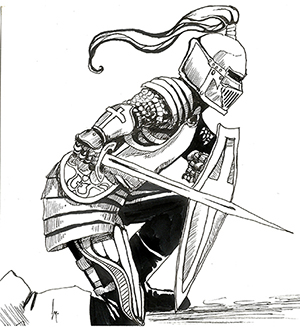The Paladin Code Part 2: Violating the Code

 What constitutes a violation of the Paladin code? This question has confounded players and Game Masters since the inception of the class and continues to do so today. On one side of the argument is the player who feels they have their agency taken away any time a Game Master “punishes” their Paladin. On the other side of the screen the Game Master feels responsible for upholding their concept of the game world and acting as judge over the rules of the game. There are a few hard and fast rules about the Paladin code throughout the editions, but they don’t do much addressing grey areas.
What constitutes a violation of the Paladin code? This question has confounded players and Game Masters since the inception of the class and continues to do so today. On one side of the argument is the player who feels they have their agency taken away any time a Game Master “punishes” their Paladin. On the other side of the screen the Game Master feels responsible for upholding their concept of the game world and acting as judge over the rules of the game. There are a few hard and fast rules about the Paladin code throughout the editions, but they don’t do much addressing grey areas.
- What happens when a Lawful Good Paladin works with a rogue known for theft?
- What if a Lawful Evil Paladin shows mercy to someone weaker than themselves?
- Do both count as violations, or do neither?
Why, or why not?
It would be impossible to cover every potential violation of the Paladin’s code, but a Game Master can and should work from some general guidelines. The following is how I break down code violations at my table.
Minuscule Violations
Minuscule violations are actions that barely count as a violation of the code. An example of this would be the Paladin forgetting to say a prayer before entering battle. Sure, this goes against the Paladin concept, but it’s hardly a big enough offense to call for a god’s attention. Not only is the deity in question likely to be concerned with such an action, but a player shouldn’t have to live in fear of forgetting a minor detail like this. If you’re a Game Master who punishes players for such minor things, maybe you need to review how you handle Paladins in your game.
Minor Violations
Minor Violations are actions that break the letter of the code, but don’t break the spirit of the code. For instance, in the 5e Player’s Handbook the Oath of Devotion requires the Paladin to be courageous. What happens if the Paladin is in a situation where they know that their death is an unavoidable outcome of a fight? By the technical definition of courage, this violates the code, but what good is a dead Paladin to their deity?
When it comes to minor violations, I feel that they should be treated as an opportunity for role-playing. The Paladin could have a bad dream, or a servitor of their deity visits the Paladin and issues a warning. If the Paladin continues to commit minor violations then something more unpleasant should happen such as a servitor coming down and beating the Paladin down. Unless the player isn’t learning the Game Master shouldn’t strip the Paladin of their power over minor violations.
Major Violations
Major violations are actions that are in direct contradiction to the Paladin’s code. An example is letting an enemy live when the Paladin follows the Oath of Vengeance (5e Player’s Handbook pg. 88). There is no debate that this breaks the oath and the Paladin needs to be brought to task. I would suggest that the Paladin be tasked with repentance, but it is not unreasonable to strip the Paladin of powers.
Grotesque Violations
Grotesque Violations are actions that not only violate the Paladin’s code, but go against everything the Paladin stands for. Slaughtering innocents is an example of grotesque violations and should result in the Paladin losing their status at the very least.
There is no way to plan for every single violation of the Paladin’s code, but the above should help a Game Master and player work out details. As always feel free to fire off in the comments below and let me know what you think. Until next time happy gaming!
Ric



